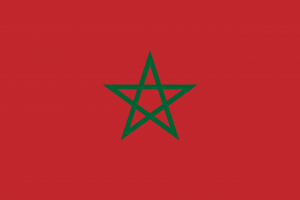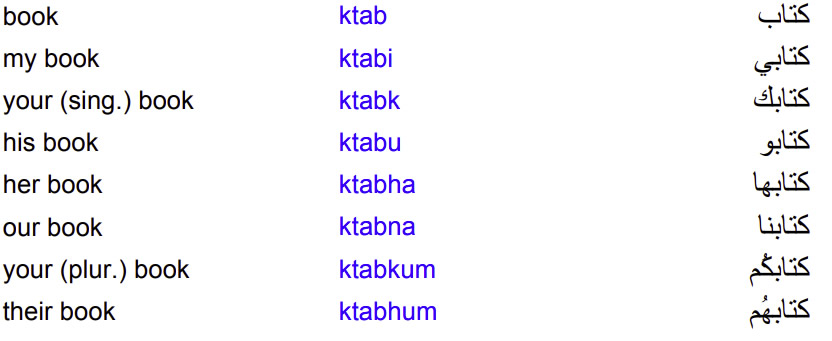Difference between revisions of "Language/Moroccan-arabic/Grammar/Possessive-Pronouns"
< Language | Moroccan-arabic | Grammar
Jump to navigation
Jump to search
m (Quick edit) |
m (Quick edit) |
||
| Line 1: | Line 1: | ||
[[File:Moroccan-Arabic-Language-PolyglotClub.png|thumb]] | [[File:Moroccan-Arabic-Language-PolyglotClub.png|thumb]] | ||
<div | <div class="pg_page_title"> Possessive Pronouns in Moroccan Arabic</div> | ||
In Darija, a suffix (ending) may be added to the end of words in order to express possession. | In Darija, a suffix (ending) may be added to the end of words in order to express possession. | ||
| Line 6: | Line 6: | ||
__TOC__ | __TOC__ | ||
<span link>After mastering this lesson, these related pages might interest you:</span> [[Language/Moroccan-arabic/Grammar/Alphabet-and-Pronunciation-in-Moroccan-Arabic|Alphabet and Pronunciation in ...]], [[Language/Moroccan-arabic/Grammar/How-to-use-%E2%80%9Ccan%E2%80%9D-in-Moroccan-Arabic|How to use “can” in Moroccan Arabic]], [[Language/Moroccan-arabic/Grammar/Pronunciation|Pronunciation]] & [[Language/Moroccan-arabic/Grammar/The-Dative-Case-in-Moroccan-Arabic|The Dative Case in Moroccan Arabic]]. | |||
== Possessive Pronouns== | == Possessive Pronouns== | ||
[[File:Moroccan-Arabic-Language-Possessive Pronouns 1 PolyglotClub.jpg]] | [[File:Moroccan-Arabic-Language-Possessive Pronouns 1 PolyglotClub.jpg]] | ||
<nowiki>*</nowiki> For the “my” and “his” forms, the first ending is used for words ending in consonants, while the second is used with words ending in vowels. For example, smiti (my name), but xuya (my brother). | <nowiki>*</nowiki> For the “my” and “his” forms, the first ending is used for words ending in consonants, while the second is used with words ending in vowels. For example, smiti (my name), but xuya (my brother). | ||
==Example of possessive pronouns with the noun “book.”== | ==Example of possessive pronouns with the noun “book.”== | ||
| Line 18: | Line 18: | ||
https://fsi-languages.yojik.eu/languages/PeaceCorps/Arabic-Moroccan/MO_Arabic_Language_Lessons.pdf | https://fsi-languages.yojik.eu/languages/PeaceCorps/Arabic-Moroccan/MO_Arabic_Language_Lessons.pdf | ||
== | ==Other Lessons== | ||
* [[Language/Moroccan-arabic/Grammar/The-verb-"To-learn"|The verb "To learn"]] | * [[Language/Moroccan-arabic/Grammar/The-verb-"To-learn"|The verb "To learn"]] | ||
* [[Language/Moroccan-arabic/Grammar/How-to-use-“to-be”-with-names-and-places|How to use “to be” with names and places]] | * [[Language/Moroccan-arabic/Grammar/How-to-use-“to-be”-with-names-and-places|How to use “to be” with names and places]] | ||
| Line 35: | Line 35: | ||
[[Category:0-to-A1-Course]] | [[Category:0-to-A1-Course]] | ||
[[Category:Moroccan-arabic-0-to-A1-Course]] | [[Category:Moroccan-arabic-0-to-A1-Course]] | ||
<span links></span> | |||
Revision as of 13:11, 27 March 2023
Possessive Pronouns in Moroccan Arabic
In Darija, a suffix (ending) may be added to the end of words in order to express possession.
After mastering this lesson, these related pages might interest you: Alphabet and Pronunciation in ..., How to use “can” in Moroccan Arabic, Pronunciation & The Dative Case in Moroccan Arabic.
Possessive Pronouns
* For the “my” and “his” forms, the first ending is used for words ending in consonants, while the second is used with words ending in vowels. For example, smiti (my name), but xuya (my brother).
Example of possessive pronouns with the noun “book.”
Sources
https://fsi-languages.yojik.eu/languages/PeaceCorps/Arabic-Moroccan/MO_Arabic_Language_Lessons.pdf
Other Lessons
- The verb "To learn"
- How to use “to be” with names and places
- The verb "to sleep"
- Alphabet and Pronunciation in Moroccan Arabic
- The verb "to Get up"
- Plurals
- Questions
- The Nominative Case in Moroccan Arabic
- How to use “there to be” in Moroccan Arabic


